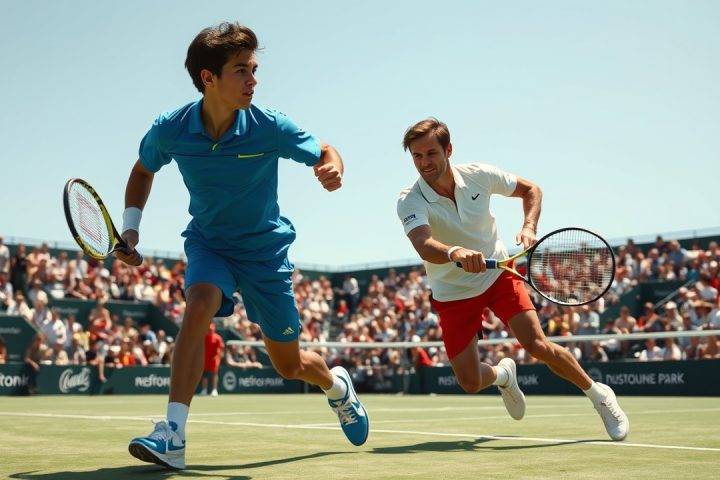The Wimbledon Championships 2025
The prestigious Wimbledon Championships are scheduled to take place from June 30 to July 13, 2025, at the All England Club. Fans can enjoy comprehensive live coverage on various platforms, including BBC TV, radio, iPlayer, and mobile applications.
Amanda Anisimova’s Journey
Amanda Anisimova, once heralded as a teenage tennis sensation and a semi-finalist at Wimbledon, has experienced a tumultuous few years. At just 17, the American athlete made headlines by reaching the semi-finals of the 2019 French Open, defeating the then-reigning champion Simona Halep, which propelled her into the top 25 players globally.
However, the pressures of professional tennis soon took their toll on Anisimova. As she grappled with burnout and mental health challenges, she made the decision to step away from the sport entirely for several months, avoiding tournaments and instead focusing on her well-being by spending quality time with family and pursuing her education. This much-needed hiatus allowed her to return refreshed and ready to compete.
Now, Anisimova is gearing up to face the current world number one, Aryna Sabalenka, in pursuit of her first Grand Slam title. Reflecting on her time away from competition, she expressed gratitude for the opportunity to rediscover herself:
“I learned a lot about myself, my interests off the court, and just taking some time to breathe and live a normal life for a bit,”
she shared in an interview with BBC Radio 5 Live.
Mental Health in Tennis
The contemporary tennis landscape is increasingly marked by mental health struggles, affecting men and women alike. Players like Matteo Berrettini and Alexander Zverev have openly discussed the psychological burden that accompanies the sport. Zverev admitted to a sense of emptiness and a lack of joy both on and off the court, while Berrettini described a lingering heaviness when playing.
Similarly, Andrey Rublev has been candid about his emotional turmoil, highlighting how sessions with a psychologist helped him cope with his anxiety and life stresses, revealing a newfound perspective on the significance of winning a Grand Slam. He recognizes that his happiness does not solely hinge on success in tennis, indicating a shift from viewing victories as the ultimate goal.
Carlos Alcaraz, a five-time Grand Slam champion, reiterated the importance of maintaining the enjoyment of the sport. In a documentary, he expressed his fear of tennis devolving into an obligation rather than a passion. His approach includes finding joy on the court and making time for personal rejuvenation, as evidenced by his trips to Ibiza, despite some pushback from his team. He emphasized the value of living in the moment during competitions.
Madison Keys, the Australian Open champion, has also highlighted the importance of mental health awareness in sports. Keys shared how therapy helped her separate her identity from her role as a tennis player, a crucial realization during tough times on tour.
Belarusian player Sabalenka has taken a proactive approach to her mental health as well, discussing her efforts to foster an open dialogue with her support team. She credits her experience in therapy for building a strong sense of personal accountability and resilience.
The Importance of Mental Health Care
Anisimova’s remarkable return to form, including her title win at the WTA 1,000 event in Doha and her rise into the top 10, stands as a testament to the importance of mental health care in sports.
“It was something that I needed to do for myself,”
she asserted, acknowledging her path to reclaiming confidence and improving her physical fitness.
As the professional tennis circuit continues to evolve, the well-being of athletes is gaining increased recognition, highlighting that success is not solely defined by on-court achievements but also by how players navigate their mental health and personal lives.




